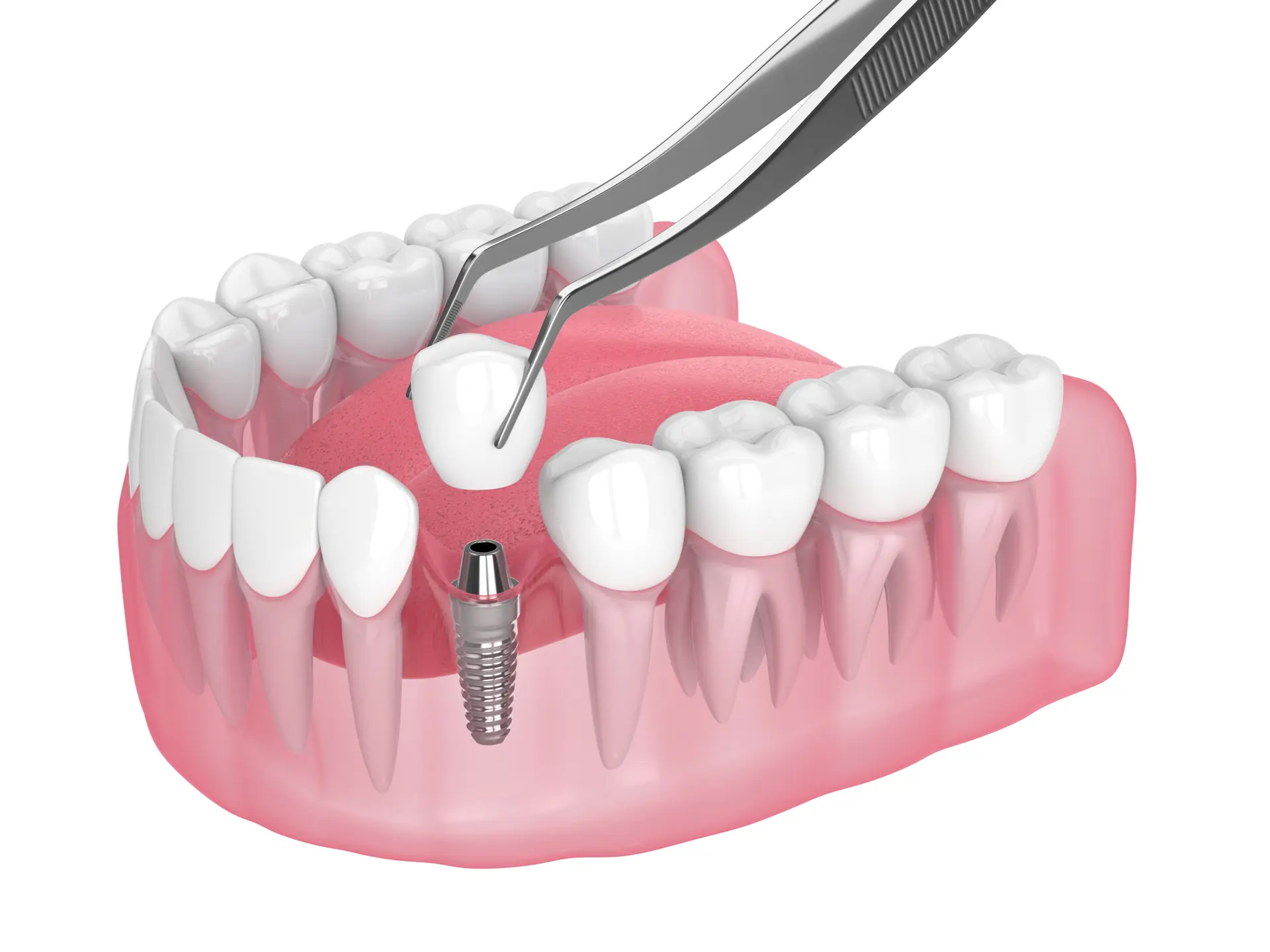Root infections, or endodontic infections, occur when bacteria invade a tooth’s pulp, causing pain, swelling, and potential damage to the surrounding tissues. Traditional treatments like root canals aim to save the tooth by removing the infected pulp. Still, these procedures may sometimes fail to resolve the issue fully or can lead to further complications.
In such cases, dental implants can offer a robust and lasting solution. Let’s explore why dental implants might be the right choice for replacing teeth affected by root infections and how they compare to other treatment options.
What Makes Dental Implants A Good Replacement For A Root Infection?
Dental implants are an excellent solution for replacing teeth lost due to root infections for several reasons:
- Mimic Natural Tooth Structure: Dental implants are designed to replicate the structure of a natural tooth closely. The implant consists of a titanium post inserted into the jawbone as a replacement root. This post provides a stable and secure foundation for a crown, bridge, or denture, closely mimicking the function and appearance of natural teeth.
- Durability and Functionality: Natural teeth can get cavities, infections, and other problems. Dental implants, on the other hand, are made of strong materials like titanium and ceramic. These materials don’t let bacteria or damage happen, so the implants will stay useful and look good for a long time.
- Bone Preservation: After a tooth falls out, the jawbone that held it in place may gradually atrophy. The preservation of bone structure is an essential function of dental implants. The process of osseointegration allows the implant to fuse with the jawbone, stimulating bone growth and preventing further bone loss. This maintains the jawbone’s integrity and helps preserve the natural facial contours.
- Long-Term Solution: Compared to other dental restorations, implants are a long-lasting solution. With proper care and maintenance, they can last for decades, making them a cost-effective investment in restoring your smile and oral health.
Overall, dental implants offer a durable, functional, and aesthetically pleasing replacement for teeth affected by root infections, providing a reliable solution supporting oral health and facial structure.
How Do Dental Implants Compare To Other Options For Root Infection Treatment?
Root diseases can be treated in a few different ways. Most of the time, root canal treatment is the first thing that is done. The infected pulp is removed, and the tooth is sealed to stop the infection from spreading. However, this procedure might only be successful sometimes, and the infection can sometimes recur or lead to complications.
Dental implants are an alternative when root canal treatments fail or are not feasible. Implants offer a long-term solution, unlike conventional fillings or crowns that may require replacement or repair down the road. They do not require altering the surrounding teeth, as with dental bridges, which involve shaving down adjacent teeth to support the bridge. Implants focus solely on the area of the lost tooth, making them a more conservative option for preserving natural tooth structure.
Can Dental Implants Prevent Further Infections After Root Canal Issues?
Dental implants can effectively help prevent further infections after problems with root canal treatments. Here’s how they provide a solution:
- Eliminating the Risk of Re-Infection: When a root canal procedure is performed, re-infection is always risky if the initial treatment isn’t entirely successful. The treated tooth might still be vulnerable to bacteria, leading to persistent or new infections. Replacing the affected tooth with a dental implant removes the source of potential infection, thus eliminating the risk associated with that particular tooth.
- Biocompatible Materials: Dental implants are made from biocompatible materials, such as titanium, which integrate seamlessly with the jawbone. These materials are resistant to bacteria and less likely to harbor infections than natural tooth roots or other dental restorations. This characteristic significantly reduces the chances of future infections in the area where the implant is placed.
- Preventing Shifting of Adjacent Teeth: When a tooth is lost and not replaced, the surrounding teeth can shift to fill the gap. This shifting can lead to misalignment, bite issues, and dental problems. Dental implants prevent this issue by providing a stable and permanent replacement, thus maintaining the proper alignment and health of your remaining teeth.
- Maintaining Oral Health: Implants help preserve the jawbone structure by stimulating bone growth through osseointegration. This prevents bone loss and supports overall oral health, reducing the risk of further complications that can arise from untreated gaps in your smile.
Dental implants are a reliable way to prevent further infections and maintain oral health after root canal issues.
Are Dental Implants A Permanent Solution For Teeth Affected By Root Infections?
Dental implants are considered a permanent solution for teeth affected by root infections. They provide a stable and durable replacement once placed and fully integrated with the jawbone. The success rate of dental implants is high, with many lasting 20 years or more with proper care.
However, while the implant is permanent, the crown or other restoration placed on top of it may need occasional adjustments or replacements due to wear and tear. Maintaining good oral hygiene and scheduling frequent dental checkups will help the implant and surrounding tissues stay healthy.
Dental implants are an excellent long-term solution for replacing teeth that have suffered damage due to root disorders. They provide a stable foundation, prevent further complications, and compare favorably to other treatment options. With their high success rate and ability to mimic natural teeth, implants are a valuable option for restoring function and appearance.
Frequently Asked Questions About Dental Implants
How Much Do Dental Implants Cost?
In terms of long-term mouth health, dental implants are a good choice. The price can change based on a number of factors, such as the number of implants needed, how difficult the process is, and if any other treatments are needed. Dental implants range from $3,000 to $4,500 per implant. This price typically includes the implant post, abutment, and crown. While the initial cost might seem high, dental implants are designed to last many years, often outlasting other dental restorations. Many patients find that the investment is well worth it for the durability and natural appearance they provide.
Does Insurance cover Dental Implants?
Dental implants may only sometimes be fully covered by insurance, but many plans offer partial coverage or benefits for implant-related procedures. It’s a good idea to check with your insurance provider to understand your coverage options. At River District Dentistry Smiles, we work with various insurance plans and offer flexible financing options to help make dental implants more affordable.
What Is the Recovery Time for Dental Implants?
Recovery time for dental implants can vary from person to person, but most patients experience a relatively quick and smooth recovery. Initial healing of the implant site usually takes about 1 to 2 weeks. During this time, you may experience swelling and discomfort—the process of osseointegration, where the implant fuses with the jawbone, takes several months. You’ll have follow-up appointments to ensure everything is progressing well during this period.
Are Dental Implants Painful?
You shouldn’t feel any pain during dental implant surgery because it is usually done with local anesthesia. Some pain and stiffness are normal after surgery, but they can usually be controlled with over-the-counter painkillers and prescription drugs. Most patients find the discomfort minimal compared to the long-term benefits of having functional and natural-looking teeth.
Transform Your Smile—Get Started Today!
Call River District Dentistry Smiles right away if you’re thinking about getting dental implants and want to know more about how they can help you. We have a helpful team here to answer all of your questions and help you through the process with care. To get the smile you’ve always wanted, don’t wait any longer—book your appointment today and start the journey to a healthier, more confident you!


